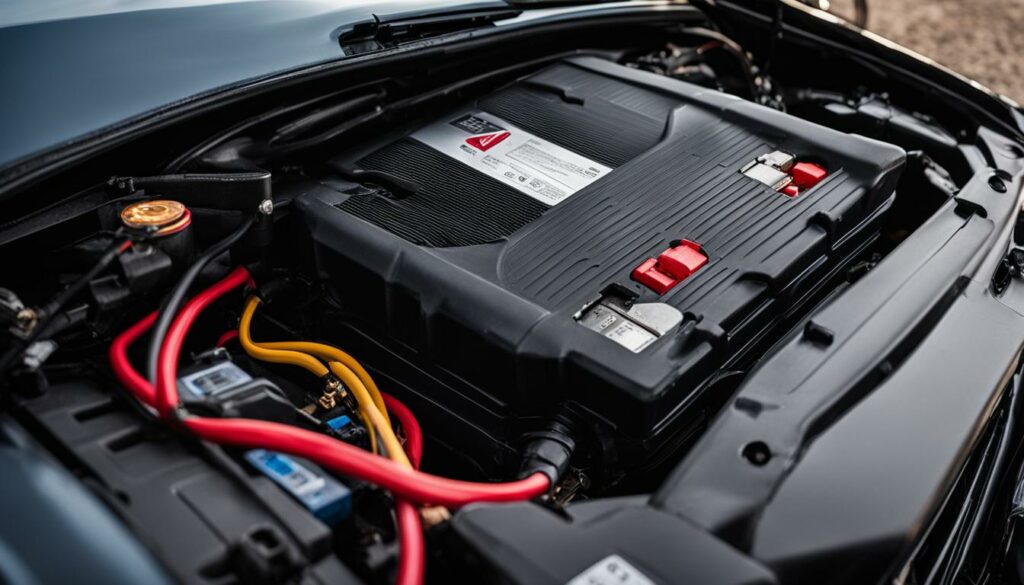Have you ever wondered about the relationship between your car’s battery and its air conditioning system? The truth is, the two are more closely connected than you might think. Your car battery plays a crucial role in powering various electrical components, including the A/C system. A weak or faulty battery can result in reduced cooling efficiency or even a complete A/C system failure.
In this comprehensive guide, we will explore how the car battery can impact the functionality and performance of your air conditioning. We’ll cover the role of the car battery in general, how it affects the A/C system, and what factors you should consider when troubleshooting any issues. By the end of this article, you’ll have a better understanding of how to maintain a healthy car battery for optimal A/C performance.
Key Takeaways:
- Your car battery powers various electrical components, including the A/C system.
- A weak or faulty battery can result in reduced cooling efficiency or even a complete A/C system failure.
- Maintaining a healthy car battery is crucial for optimal A/C performance.
- Common battery-related issues can affect A/C performance, such as low voltage or faulty connections.
- Regular battery maintenance and seeking professional assistance when necessary can help you avoid potential A/C problems.
Understanding the Role of the Car Battery
Before we explore how the car battery affects your air conditioning system, let’s take a moment to understand the important role your car battery plays in powering various electrical components, including the A/C. Your car battery serves as the primary power source for starting your engine and providing electricity to all the components that make your car run, from the headlights to the radio.
When you turn the key in the ignition, the battery sends an electrical signal to the starter motor, which cranks the engine and gets it running. Once the engine is on, the alternator takes over, converting mechanical energy from the engine into electrical energy to power the car’s electrical systems and recharge the battery.
As for the air conditioning system, the battery powers the A/C compressor, which is responsible for circulating refrigerant and producing cool air. Without a healthy battery, your A/C may not work properly or may not work at all.
The Basic Science of Car Batteries
If you’re curious about the inner workings of your car battery, it’s helpful to know that most modern car batteries are lead-acid batteries. These batteries are made up of six cells, each containing lead plates submerged in a solution of sulfuric acid and water.
When the battery is charged, a chemical reaction occurs that transforms the lead plates into lead sulfate and releases electrons that flow through the battery’s circuit. When you turn the key in the ignition, the battery discharges those stored electrons to power the starter motor and get the engine running.
Over time, the chemical reaction that powers the battery can degrade the lead plates and reduce the battery’s capacity to store and deliver electrical power. That’s why regular battery maintenance, such as cleaning and testing, is crucial to ensure a long and healthy battery life.
“Your car battery serves as the primary power source for starting your engine and providing electricity to all the components that make your car run, from the headlights to the radio.”
How the Car Battery Affects Air Conditioning
Now, let’s explore the specific ways in which the car battery can affect the air conditioning system. The car battery plays a crucial role in providing power to the A/C compressor, which is responsible for cooling the air inside your car. If the battery is weak or faulty, it may not be able to supply the necessary electrical voltage to the compressor, resulting in reduced cooling capacity or complete A/C system failure.
One of the most common symptoms of a battery-related A/C issue is reduced cold air production. If you notice that the air coming out of the vents is not as cold as usual or takes longer to cool down, your car battery may be the culprit. Other warning signs include a weak or erratic A/C performance, strange noises coming from the A/C system, and frequent A/C system cycling.
It’s essential to remember that the A/C system is just one of many electrical components that rely on the car battery for power. If your battery is weak or dying, it may also affect other systems and devices, such as lights, radio, and power windows. Therefore, it’s crucial to address any battery-related issues promptly to ensure optimal performance and prevent further damage to your car’s electrical system.
The Impact of Temperature on Your Car Battery
Extreme temperatures, both hot and cold, can also affect your car battery’s health and performance. In hot weather, the battery may become overheated and lose its ability to hold a charge, while in cold weather, the battery may struggle to produce enough power to start the engine. To mitigate these effects, it’s recommended to park your car in a garage or shaded area during hot weather and use a battery blanket or heater during cold weather.

Regular battery maintenance is also crucial for ensuring optimal A/C performance and preventing battery-related issues. In the next section, we’ll explore some practical tips and best practices for maintaining a healthy car battery.
Maintaining a Healthy Car Battery for Better A/C Performance
Proper battery maintenance is essential for ensuring optimal air conditioning performance in your car. Here are some practical tips to keep your battery in good shape:
| Tip | Description |
|---|---|
| Regular Inspection | Check your battery regularly for signs of wear and tear, corrosion, leaks, or other damage. Look for bulges, cracks, or discoloration on the battery casing. |
| Cleaning | Keep your battery clean and free of debris and dirt. Use a damp cloth or a battery cleaner to remove any buildup on the terminals and connectors. |
| Testing | Check your battery’s voltage level and capacity regularly using a voltmeter or a battery tester. If your battery shows signs of weakness, such as slow cranking or dim lights, have it checked by a professional technician. |
| Temperature Control | Avoid exposing your battery to extreme temperatures, both hot and cold. High temperatures can cause water loss and faster degradation, while low temperatures can reduce the battery’s capacity and performance. |
| Preventive Measures | Take preventive measures to extend your battery’s lifespan, such as disconnecting it during long periods of inactivity or using a battery maintainer or charger. |
By following these simple steps, you can ensure that your car battery is in top condition and that your air conditioning system is working efficiently. Remember that a healthy car battery is key to optimal A/C performance, especially during hot summer days.
Troubleshooting Battery-Related A/C Issues
If your car’s air conditioning system is not functioning properly, it could be a sign of battery-related issues. Here are some troubleshooting steps you can follow:
- Check for low voltage: Low voltage can cause the A/C compressor to malfunction, resulting in reduced cooling efficiency. Use a voltmeter to check your battery’s voltage. If it’s below 12.6 volts, the battery may be the culprit.
- Inspect the connections: Loose or corroded battery connections can prevent the A/C system from receiving enough power. Check the battery terminals and cables for signs of corrosion or damage, and ensure they are tightly connected.
- Test the battery: A weak or dead battery can cause A/C problems. Use a battery tester to check the battery’s condition. If it’s below the recommended level, consider replacing it.
- Address discharged battery: If your car has been parked for an extended period, the battery may have discharged. Jump-start the battery or use a battery charger to bring it back to life.
If these troubleshooting steps don’t resolve the issue, it’s best to seek professional assistance from a qualified mechanic or technician.

Conclusion
In conclusion, your car’s battery plays a significant role in the performance of your air conditioning system. A weak or faulty battery can lead to reduced cooling efficiency or even complete A/C system failure. Therefore, it’s crucial to maintain a healthy battery for optimal A/C performance. Remember to inspect, clean, and test your battery regularly, and take preventive measures to extend its lifespan.
If you experience battery-related A/C issues, such as low voltage, faulty connections, or a discharged battery, troubleshoot before seeking professional assistance. However, if you encounter persistent A/C problems, don’t hesitate to seek professional help.
By prioritizing your car battery’s maintenance, you can avoid potential A/C problems and enjoy cool and comfortable journeys all year round. Thank you for reading, and we hope this guide has been helpful in understanding how your car’s battery affects your A/C.


